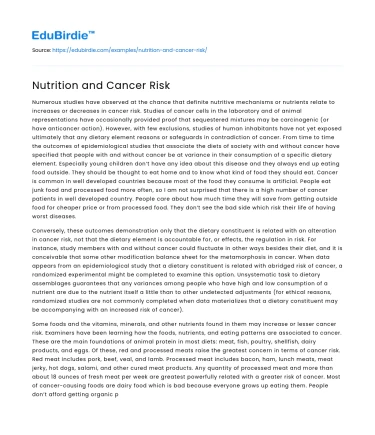Introduction
Cancer remains a formidable challenge within the global health landscape, accounting for millions of deaths each year. Nutrition, an integral component of human health, plays a pivotal role in both the prevention and progression of cancer. The correlation between dietary habits and cancer risk has been extensively studied, revealing that certain dietary choices can either mitigate or exacerbate the likelihood of developing cancer. As our understanding of the biochemical pathways involved in cancer pathogenesis expands, so does the recognition of the potential for dietary interventions. This essay explores the intricate relationship between nutrition and cancer risk, evaluating the evidence supporting the impact of specific nutrients and dietary patterns on cancer development. By examining real-life cases and credible scientific findings, this analysis aims to illuminate how informed dietary choices can contribute to cancer prevention and control, while also addressing the nuances and challenges inherent in this domain.
Impact of Nutrients on Cancer Risk
The role of specific nutrients in modulating cancer risk has garnered significant attention. Antioxidants, for instance, are compounds found in various fruits and vegetables that can neutralize free radicals – unstable molecules that can cause cellular damage leading to cancer. A study published in the journal "Cancer Epidemiology, Biomarkers & Prevention" highlighted how diets rich in antioxidants, particularly vitamins C and E, are associated with a reduced risk of several types of cancer, including lung and stomach cancers. Moreover, dietary fiber, which is abundant in whole grains, legumes, and vegetables, has been linked to a lower incidence of colorectal cancer. The mechanism is thought to involve fiber's ability to bind carcinogens in the digestive tract, facilitating their excretion and reducing their contact with the intestinal lining.
Conversely, the consumption of processed meats, which are high in preservatives like nitrites and nitrates, has been classified as carcinogenic by the World Health Organization. These compounds can form nitrosamines, potent carcinogens, in the human body. Epidemiological data underscore the link between high intake of processed meats and an elevated risk of colorectal cancer. A balanced intake of these nutrients, therefore, becomes crucial in modulating cancer risk. While the evidence for the protective effects of certain nutrients is compelling, it is also essential to acknowledge the complexity of diet-cancer interactions. Factors such as genetic predisposition, environmental influences, and lifestyle choices can modulate these effects, highlighting the need for personalized dietary recommendations.
Dietary Patterns and Cancer Prevention
Beyond individual nutrients, overall dietary patterns significantly influence cancer risk. The Mediterranean diet, characterized by high consumption of fruits, vegetables, whole grains, nuts, and olive oil, has been associated with a reduced risk of several cancer types, including breast and colorectal cancers. This diet's high content of anti-inflammatory and antioxidant foods is thought to confer protective effects by reducing oxidative stress and chronic inflammation, both of which are implicated in cancer development. A study in the "American Journal of Clinical Nutrition" demonstrated that adherence to the Mediterranean diet was linked to a 12% reduction in cancer mortality.
In contrast, the Western diet, high in saturated fats, sugars, and red meats, is associated with an increased risk of cancer. This dietary pattern often leads to obesity, a known risk factor for various cancers, including breast, liver, and pancreatic cancer. Excess body fat can create a pro-inflammatory environment and produce higher levels of insulin and estrogen, hormones that can promote cancer cell growth. Transitioning to healthier dietary patterns can therefore serve as a practical strategy for cancer prevention. However, changing dietary habits can be challenging due to cultural, socio-economic, and psychological factors. Public health initiatives and policy changes that promote access to healthy foods and educate the public about cancer-preventive diets can play a crucial role in facilitating these transitions.
Counter-Arguments and Considerations
While the evidence supporting the role of nutrition in cancer prevention is compelling, some counter-arguments highlight the limitations and challenges in establishing direct causal relationships. Critics point to the inherent difficulties in isolating specific dietary factors in epidemiological studies due to the complex nature of human diets and the long latency periods of cancer. Moreover, the bioavailability and efficacy of nutrients can vary depending on factors such as food preparation methods and individual metabolic differences. A review in the "Journal of the National Cancer Institute" emphasizes that while observational studies provide valuable insights, randomized controlled trials are necessary to validate these findings.
Furthermore, some argue that focusing solely on diet may overlook other significant factors such as genetics, infections, and environmental exposures that contribute to cancer risk. Therefore, a holistic approach that considers multiple aspects of lifestyle and environmental interactions is essential for effective cancer prevention. Despite these challenges, the potential of nutrition as a modifiable risk factor for cancer remains a critical area of research, with the promise of contributing to comprehensive cancer prevention strategies.
Conclusion
In conclusion, the intricate relationship between nutrition and cancer risk underscores the potential of dietary interventions in cancer prevention. While specific nutrients and dietary patterns have been shown to influence cancer susceptibility, the complexity of diet-cancer interactions necessitates a nuanced understanding of this relationship. Despite the challenges in isolating dietary effects, the evidence supports the adoption of healthy eating habits as part of a comprehensive approach to cancer prevention. Addressing counter-arguments and considering the broader context of cancer risk factors further strengthens the case for nutrition's role in mitigating cancer risk. As research advances, personalized nutrition recommendations based on genetic, environmental, and lifestyle factors may offer even greater precision in cancer prevention efforts. Ultimately, leveraging the power of nutrition holds promise for reducing the global cancer burden and improving public health outcomes.






 Stuck on your essay?
Stuck on your essay?

